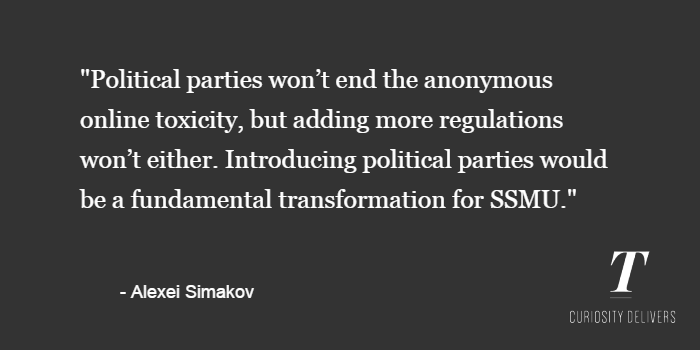Of the many problems afflicting the Students’ Society of McGill University (SSMU) today, the most pressing is a broken electoral system. Much attention has been focused on the “intensely negative online culture,” and suggestions such as vesting the Chief Electoral Officer with greater powers or limiting use of social media by candidates have been proposed as solutions—but this is just a symptom of the deeper problems. One is voter turnout, which in in the last election was a depressing 8.7 per cent of eligible students. The other is the outcome, which regularly produces an executive with fairly homogenized views that are perceived to represent the same faction at the expense of other demographics. Candidates are increasingly forced to campaign not for the entire student body, but for the small minority that bothers to vote.
The best option is for SSMU to fundamentally restructure its electoral process by adopting a system of formal political parties. Let like-minded students organize themselves and, year after year, run for each position under a common platform. SSMU needs to adopt the process by which democracy functions in the majority of the world.
Candidates typically run on mostly indistinguishable platforms filled with empty platitudes. In the short two weeks of a campaign period, students find it easier to assess a candidate’s history and reputation than their policy proposals. Established parties would develop their ideologies and more clearly advance certain priorities, whether that be equity, fiscal responsibility, or whatever else candidates choose. The current barriers to making an informed decision for the marginal voter are unreasonably high. With anywhere from zero to five candidates running for six executive positions and 30 councillor seats, students must make a significant investment to decide which of those candidates would best represent their interests. Parties with distinct platforms would better communicate this information to voters.
The ballot box is students’ only viable opportunity for actual accountability. It doesn’t happen under the current system because student politicians rarely stand more than a single year and so cannot be influenced by re-election. Rewarding a party for a successful year by voting for their next year’s candidates, or the opposite, would be a great improvement. Greater continuity would also improve the efficacy of multi-year projects. Additionally, an organized opposition would stimulate transparency. A competitive party system would not only incentivize greater communication and transparency of legislative shortcomings to the public, it would likewise spur parties to more actively promote their successes. The average voter’s attention would be competed for, not ignored.
Political parties would level the playing field and improve the overall quality of SSMU elections. Running a campaign is incredibly difficult and chaotic. The daunting mass of the tasks, people, and stress to handle is mostly behind the scenes and invisible to the public; but for a candidate, it means choosing between sleep, food, or school. A party system would allow veteran campaigners to assist rookie candidates. Within the party itself, it would be a more sustained transfer of knowledge from older to younger students, not just about winning elections but more broadly about how SSMU works and how it doesn’t. A larger, experienced team of volunteers would be more capable of taking responsibility for the many administrative tasks so that candidates can spend the two weeks actually campaigning. Institutionalized parties would create opportunities for students to get involved, especially for those who aren’t as enthusiastic about the current direction of SSMU.
Lastly is the pressing concern of personal attacks. Party politics won’t end the temptation of drawing the skeletons out of a candidate’s closet, but a campaign focused on policies rather than personalities will help ease it. Strategically speaking, a single scandal could effectively end an individual’s campaign, but would do relatively much less damage to a team of six. Likewise, having equally invested peers on their side would make it much easier to weather the storm and respond to the situation. Political parties won’t end the anonymous online toxicity, but adding more regulations won’t either. Introducing political parties would be a fundamental transformation for SSMU. McGill’s student democracy is in crisis–this is an opportunity that would be foolish to waste.
Do you have opinions on how best to restructure SSMU and the electoral process? Contact the Tribune opinion section at [email protected].










Adding parties to the SSMU mix would add no more accountability to officeholders, but would leave them beholden to a extra-democratic pressure group, not to mention provide them with a means to deflect personal accountability. In the executive positions, it would badly undermine office-holders’ effectiveness – and their portfolio’s success – if one “opposition” executive was constantly having to defend the legitimacy of their mandate against perhaps all the others elected on a different platform.
To compare it to a country (which, I don’t think is a good example, but it is where parties reign supreme) the models of which I am aware of the executive branch coming from different parties is in coalition governments (which require a Parliamentary model, in which the executive is selected from members of the legislative and will cease to exist as soon as it loses the support of the legislative house) or the Presidential model where executive members are appointed by the head of state, serve at his or her pleasure and derive their legitimacy from the President’s (as in the U.S.) I am not aware of any where peer executives are directly elected into their roles, and therefore have an independent mandate that might directly clash with every other member of the executive committee’s, with no democratic mechanism to end anyone’s mandate.
To bring the scale down somewhat more to SSMU-scale (though, not really) Montreal is one of the few cities in Canada in which elections are contested on party lines. I don’t think there is any evidence that it is any better governed, or its politicians more accountable, than in other cities.